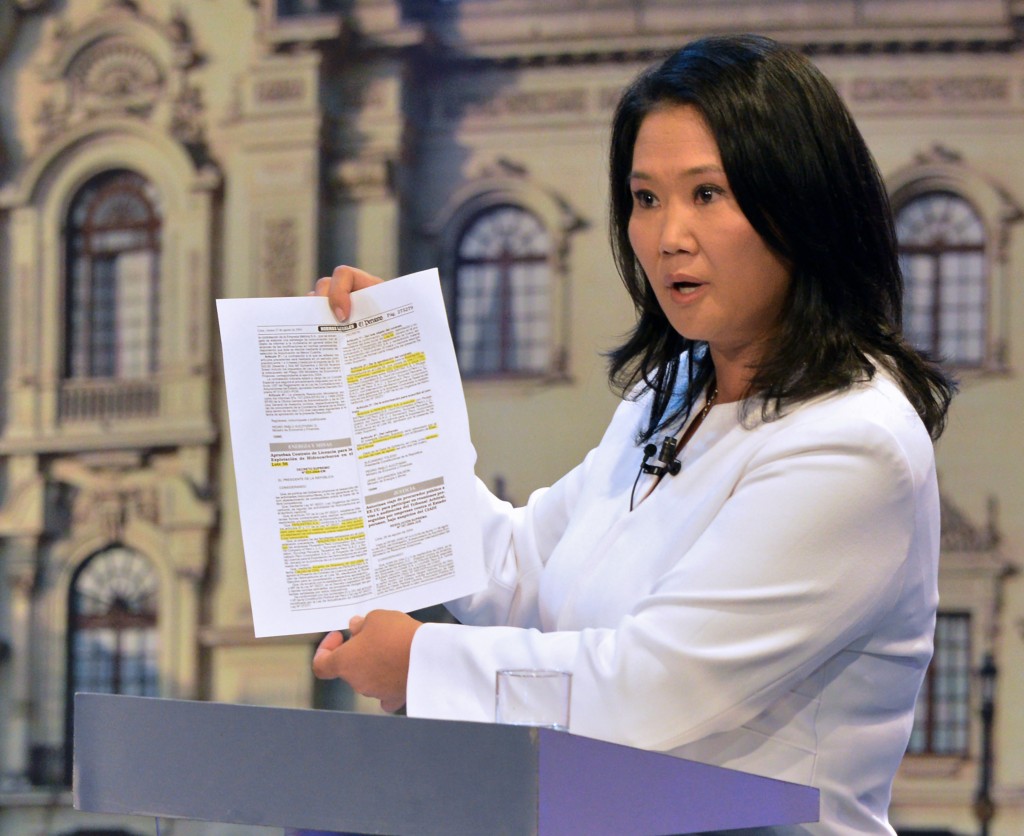
Fujimori and Kuczynski will compete in Peru’s June 5 runoff election. / AFP PHOTO /
by Luis Jaime CISNEROS
LIMA, Peru (AFP) — Peru presidential hopeful Keiko Fujimori touted her political leadership skills Sunday in a final debate with center-right rival Pedro Pablo Kuczynski one week before a runoff vote.
Fujimori, 41, a right-wing populist with the Popular Force party, has 46 percent of public backing going into the June 5 vote, polling firm Ipsos found in a survey also published on Sunday.
Her rival, 77 year-old center-right economist Kuczynski, running under the banner of his self-created party Peruanos por Kambio (Peruvians for Change), is lagging with 40.6 percent support.
Fujimori, the daughter of the disgraced ex-president Alberto Fujimori, used the debate to underscore how in the past five years she had built her party into the Andean nation’s leading force; it controls 73 of 130 congressional seats.
“I have done the work. And I am ready,” she said.
“We know what we want to do… I have the strength to work for a country at peace with itself,” she said, aiming jabs at her rival.
Former World Bank executive Kuczynski spoke forcefully about economic plans but did not quickly respond to many of Fujimori’s attacks.
Fujimori, who would be Peru’s first woman president, is the political heir to her father’s controversial rule from 1990 to 2000.
Alberto Fujimori, 77, is serving a 25-year sentence for massacres committed by an army death squad during his rule.
His decade-long tenure saw the economy grow but was also plagued by corruption and brutal human rights abuses, committed in the name of wiping out the communist guerrilla group Shining Path.
Kuczynski, who goes by the nickname PPK, said a Keiko Fujimori presidency would be a return to widespread graft and abuse of power.
‘Threat to democracy’
“We need an experienced pilot to fly this jet through turbulent skies,” Kuczynski said, not someone whose government would mark “a threat to democracy.”
Since winning 39 percent of the vote to 21 percent for Kuczynski in the first round on April 10, Keiko Fujimori has sought to distance herself from her father’s authoritarian image and has vowed to work to unite a deeply polarized Peru.
She appears not to have been hurt so far by allegations of money laundering during her first run for the presidency in 2011.
Her campaign also has been accused of dirty tricks, after her vice presidential candidate Jose Chlimper was accused of sending a doctored video to a television station in an alleged bid to smear their political enemies.
Kuczynski, a former prime minister, has had a colorful career as an international businessman and financier, according to his official website.
He says his father, a doctor, was an officer in the German army in World War One but fled his native country when Hitler came to power and ended up in Peru treating lepers.
Kuczynski was educated at a school in northern England and then at Oxford University and Princeton before working in Latin America for the World Bank.
He says he was expelled from Peru in a military coup in the 1960s while serving as head of the state reserve bank.
Kuczynski has vowed to create jobs if elected by boosting business and growth.
Peru has one of Latin America’s fastest-growing economies despite a recent fall in commodity prices and a slowing under outgoing President Ollanta Humala.
Fujimori has promised to spend generously on infrastructure and to have more prisons built as part of a crackdown on crime.
ljc-mav/sg-mdl/sm
© 1994-2016 Agence France-Presse








